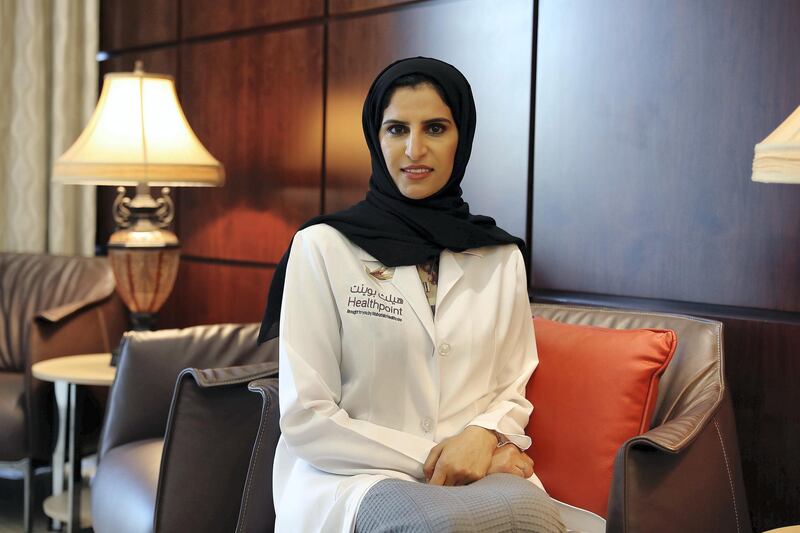Public and private hospitals in Abu Dhabi will share medical records for the first time to cut down on costs, prescription errors and repeat testing.
The unified database will link the complete medical data of hundreds of thousands of residents and citizens, giving all doctors access to data from hospital visits and lab tests from any healthcare centre.
The Health Information Exchange system will be introduced over four years. At present, doctors rely on patients’ honesty about pre-existing conditions and test results.
It will enable doctors to make better informed decisions and to increase quality of service, while also maintaining confidentiality.
For patients, the system will ensure better diagnosis of ailments and empower them with knowledge about their own healthcare history, the Department of Health said.
“The new system will help reduce the number of re-hospitalised patients, unnecessary laboratory and imaging tests, emergency admissions and the length of hospitalisation, which will lead to better and more efficient standards in health care,” said Sheikh Abdullah Al Hamed, chairman of the department.
The secure system will be developed under Injazat Data Systems, a Mubadala subsidiary, and implemented in three phases until 2022.
In the first stage, the system will link four of the city’s biggest healthcare providers – Cleveland Clinic Abu Dhabi, Seha hospitals, Imperial College London Diabetes Centre and Healthpoint.
Hospitals managed by Seha, the Abu Dhabi Health Services Company, are connected under the Malafi system and have yet to be linked to providers outside their network.
By 2020, the electronic system will include all private hospitals and, in 2022, all the capital’s 2,000 healthcare providers should be connected.
Dr Mai Al Jaber, medical director of Healthpoint, said the unified system was a “dream that has finally come true”.
“This is the dream of most healthcare providers to have an integrated medical file for every patient to have a better insight on the individual's health,” she said.
“The system aims to improve the UAE’s healthcare services by facilitating the movement and transfer of patients among different healthcare providers, reduce registration times, eliminate duplications, prevent prescription errors and reduce costs."
A unified system will also result in an “indispensable database” that can be used as a valuable research tool, she said
“This provides the UAE with steadily accumulating data on the efficacy and safety of new procedures and medications in the global medical setting. It will streamline administrative systems and promote better outcomes that translate to less utilisation of overall resources,” she said.
But there are challenges ahead, according to Dr Al Jaber, particularly in the migration of data into the new system.
“Data such as medications, allergies, problem lists and recent lab results must be transferred, as well as scanned images, social history and lab results. A clinician’s need for such information is time-sensitive and can be life-saving,” she said.
Dr Rakesh Suri, chief executive of Cleveland Clinic Abu Dhabi, said the database would be a valuable tool for all healthcare providers.
“Globally, electronic medical records are the single most important tool available to us to improve patient outcomes and decrease the cost of care. Their introduction positively impacts our patients, our caregivers, healthcare organisations and the community.”
No country has yet managed to completely digitalise their health records, let alone unify them in one database.
Obstacles include cost, lost productivity for training and software glitches.
In 2008, Estonia became the first country to implement a nationwide “birth-to-death” electronic health record system for nearly every citizen. In 1977, Denmark began a centralised electronic database for basic records of its citizens.
_____________
Read more:
[ Gulf Medical University launches centre to train student doctors in AI ]
Off-hours: Medical college founder says work is his indulgence
The UAE will save billions thanks to artificial intelligence, says AI minister
_____________
Last year, Dubai launched a central database that unifies the medical records of five healthcare centres.
Salama, announced in February 2016, centralises access to records for patients and doctors through the new portal across DHA health facilities.
In 2015, the UAE Cabinet backed a unified national database of patients' medical records that was due to be implemented by 2019.
Although the UAE has already established national health databases they have been disease-specific up to this point.
Registries for cancer, genetic diseases and organ donors exist in some form but an overarching database had only previously been discussed.
“The UAE has been leading the way in using national electronic health record information and now it’s the time for implementation,” Dr Al Jaber said.





